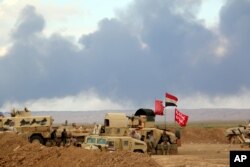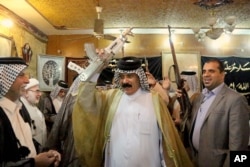Some Sunni tribes in Syria and Iraq, driven from their ancient lands by Islamic State (IS), are planning their return in a post-IS scenario.
VOA has learned that dozens of tribes, whose ancestors date back to Biblical times, are waiting in Iraqi and Syrian areas outside of IS control, weighing strategies and hoping to return home more powerful than ever.
"Arab tribes cannot do much currently, given that [IS] controls all aspects of life," Qussai Hwaidi, a Syrian activist who closely works with tribal leaders in IS-stronghold Raqqa, told VOA. "They can play a huge role in bringing peace and order once IS has been pushed back."
IS is facing an onslaught as a U.S.-led coalition is backing Iraqi and foreign troops to drive them from the Iraqi cities of Fallujah and Mosul. In Syria, Kurdish and Arab forces are moving toward the IS de-facto capital of Raqqa.
Tribal leaders have been meeting with local authorities to map out plans. Tribes have had difficulties under IS rule, with some leaders fleeing and others left behind in IS territory.
Allegiance or persecution
Since the rise of IS, many Arab tribal leaders in Iraq and Syria have pledged allegiance to the group, fearing persecution and repression and hoping to remain on their lands. Those who have refused loyalty have faced persecution.
In 2014, IS allegedly killed 700 members of a prominent Syrian tribe called al-Shaitat when the tribal leaders refused to pledge allegiance.
IS tried to keep tribal differences in check as it established a networking infrastructure of the Diwan al-'Asha'ir (Council of Tribal Outreach), which is responsible for tribal affairs in Iraq and Syria. It prevented in-fighting among tribes while under IS control.
"IS has successfully maneuvered conflicts among tribes," Hello Najat, the head of the Iraqi security office in the city of Kirkuk, told VOA.
Earlier this year, clashes erupted between tribes in Iraq over how to detain people fleeing from IS territories.
"They started shooting each other over why someone from Jbour [tribe] at checkpoints can arrest someone from Obeid [tribe] and vice versa," Najat said. "IS removed tribe members from the checkpoints and replaced them with foreign fighters to resolve the problem."
Post-IS scenario
The U.S. and its allies have trained and armed thousands of Sunni tribal members of Iraq and Syria in the last two years, but could not put together a cohesive tribal force.
While Sunni tribes can be crucial to hold the traditionally Sunni areas after IS, their participation in the fight against IS also helps to bring an effective Sunni presence in the operation, Michael Knights, an Iraqi expert at the Washington Institute, told VOA.
"We have to essentially recruit Sunni tribal members either directly into the armed forces like the [Iraqi] army and the federal police," he said.
Alternately, he suggests that the U.S. should help develop them as a support group where the Iraqi army would carry the main fighting along with Kurdish Peshmerga forces.
"The Sunni tribal forces will really be there to help to hold liberated areas and to provide a sort of Sunni face to the operation," Knights said.
Ahmed Mahmood of the al-Hadidi tribe, one of the largest Sunni tribes in Iraq's Nineveh province, met last month with 25 leaders from other tribes to discuss their role in the liberation of the city of Mosul from IS militants.
"We ask the president of Kurdistan region, Masoud Barzani, to support us in forming a tribal mobilization force to participate in the liberation of Mosul," said Mahmood, referring to the Iraqi Kurdish leader who has often called for preserving the rights of Sunni tribes.
Non-Sunni groups in Iraq and Syria make efforts to mobilize those Sunni tribes and enlist them into their respective forces as a legitimization tool to attack IS-held Sunni territories, experts say. Sunni tribes, in return, demand control over their affairs and local security — a call that will change the balance of power between them and their governments after IS.
But analysts say only a consensus within the Shi'ite-dominated government in Baghdad can straighten out its strained relations with Sunni tribes.
The central government will continue to govern the areas, but there needs to be negotiations on balance of power at all levels, Knights said.
"There is no way the federal government is going to be completely excluded from any of the areas outside of the Kurdistan region, but it can change the way it operates in these places," he said.
"Typically, they [tribes] don't want outsiders to come in policing them and arresting them."







